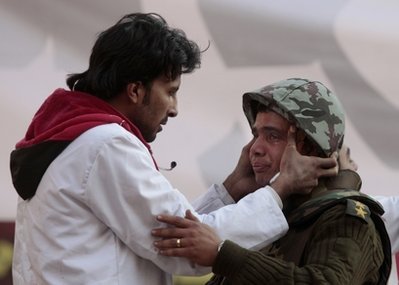“THE TREE OF LIBERTY MUST BE REFRESHED FROM TIME TO TIME WITH THE BLOOD OF PATRIOTS AND TYRANTS” – Thomas Jefferson
I watch with trepidation as the struggle for democracy unfolds in the Middle East. I wonder if freedom will prevail or if some other power broker will emerge as it did in Iran after the Shah was deposed. One political protester in Egypt’s Tahrir Square said the outcome didn’t matter as long as what followed was the will of the people. A good thought. An innocent thought… but I wonder if the people of Iran would agree. I wonder, too, if “the will of the people,” includes women.
But my interest today isn’t focused on the future of Egypt. Somehow the country will find its way. My interest and respect lies with the journalists courageous enough to bring us the news from this war zone. Certainly, they are risking their lives to do so and I want to honor that sacrifice. Without their presence, we would learn little of the unfolding events except as a set of statistics: the number of people arrested, or beaten or killed. Stunning in themselves, they are not as comprehensible as the interviews journalists’ bring us of individuals who are making a stand. These narratives put a human face on the struggle.
There are times, too, when a photojournalist can take our breath away with a single image. At the end of World War II, that instant was a happy one — a sailor kissing a girl in Times Square. During the Viet Nam war, the image that broke our hearts was of a naked child running alone on a dirt road, her tear stained face reflecting the agony of being burned by napalm. Tiananmen Square was eloquently expressed in the photo of a solitary youth as he attempted to stop a military tank with no greater force than his body. These are examples of journalism that by-passes the brain and go straight to the heart.

-Cairo, February 2, 2011. AP photo-
Yesterday, I saw another story without words – a photo from Cairo which shows a demonstrator confronting a young soldier after he has shot live ammunition into a crowd of his fellow Egyptians. We need no narrative here. The story is in the faces of both men as one reaches out to reason with the other. We can almost hear the words being spoken: “We are your countrymen, my friend. We are brothers.” Whatever was said, the tears in the soldier’s eyes are nothing less than an act of contrition.
In the midst of violence, the photojournalist had seen a moment of hope. Even in the darkest times, if we remember the humanity of our adversaries, sometimes we can breach the wall of anger and embrace one another.